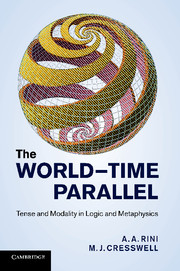Book contents
- Frontmatter
- Contents
- Preface
- Introduction
- PART I TRUTH AND INDEXICALITY
- PART II PREDICATE LOGIC: TENSE AND MODAL
- PART III TIMES AND WORLDS, OR TENSE AND MODALITY?
- PART IV DE RERUM NATURA
- Appendices
- 1 The equivalence of ℒmulti, ℒxtw and ℒi
- 2 Language and metalanguage
- 3 Plantinga's metaphysics
- 4 Interval semantics
- 5 Fatalism and the world–time parallel (with H. Kocurek)
- Bibliography
- Index
5 - Fatalism and the world–time parallel (with H. Kocurek)
from Appendices
Published online by Cambridge University Press: 05 March 2012
- Frontmatter
- Contents
- Preface
- Introduction
- PART I TRUTH AND INDEXICALITY
- PART II PREDICATE LOGIC: TENSE AND MODAL
- PART III TIMES AND WORLDS, OR TENSE AND MODALITY?
- PART IV DE RERUM NATURA
- Appendices
- 1 The equivalence of ℒmulti, ℒxtw and ℒi
- 2 Language and metalanguage
- 3 Plantinga's metaphysics
- 4 Interval semantics
- 5 Fatalism and the world–time parallel (with H. Kocurek)
- Bibliography
- Index
Summary
This appendix discusses an argument against presentism in Rea 2006, that a presentist has to give up either bivalence or libertarianism. It is an interesting argument, since presentists like Prior seem to have supposed that it is eternalists who are committed to determinism. Admittedly Prior seems to want to give up bivalence, and in fact the search for a non-bivalent tense logic forms a large part of chapters 9 and 10 of Prior 1957 (pp. 84–93 and 94–103), and chapter 7 of Prior 1967 (pp. 113–136), though in Prior 1976, pp. 99–101, Prior suggests a solution that instead rejects the inevitability of past statements when they are ultimately about future events. Prior is in fact one of the most careful presentists, and in some ways anticipates Rea's argument. A particular advantage of looking at Prior's work is that he was insistent on presenting his views about time in systems of formal logic. We shall give an exposition of Rea's argument, and then compare it with an analogous argument against actualism, with the aim of showing that if Rea is successful against bivalent presentism his argument works equally against bivalent actualism.
- Type
- Chapter
- Information
- The World-Time ParallelTense and Modality in Logic and Metaphysics, pp. 233 - 241Publisher: Cambridge University PressPrint publication year: 2012



